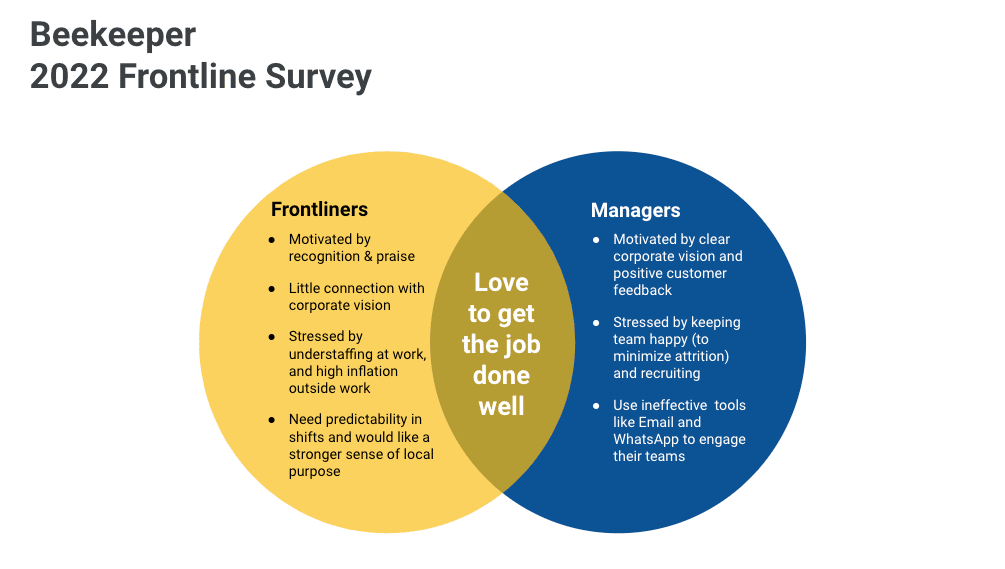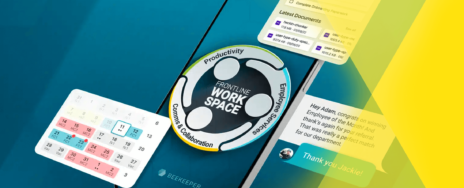“I would love to not have to work 12 hours or more every day so that I can also have a private life.”
– Frontline Hospitality Manager
We’ve all heard this age-old expression before — “People don’t quit jobs. They quit bad managers.”
In the post-COVID era, companies have struggled to retain a vital segment of their workforce — frontline employees. In response, organizations that rely on frontline workers have taken drastic steps this year to recruit and retain these essential workers.
These frontline retention efforts include:
- Raising wages
- Offering bonuses
- Offering more competitive benefits
- More flexible work hours
But there’s a large piece of the puzzle that’s still missing — the critical role of the frontline manager.
Frontline managers are one of the largest segments of the workforce. According to Harvard Business Review, they makeup 50% to 60% of a company’s management ranks and directly supervise as much as 80% of the workforce.
Beekeeper’s Frontline Survey Reveals that Frontline Managers Are Understaffed, Burned Out, and Undersupported by Executives
We recently surveyed 2,419 frontline managers around the world to better understand what motivates them, what stresses them out, and what they love about their jobs.

What we found is that across industries, frontline managers are overworked, understaffed, and inadequately supported to succeed in their roles.
Let’s take a deeper look at who frontline managers are, the challenges they face, and what they need to lead high-performing frontline teams.
Who Are Frontline Managers and What Do They Do?

“Frontline manager” is an umbrella term that encompasses team leads, shift managers, field managers, line supervisors, and more.
Oftentimes, frontline managers are employees who began their journey with the company as frontline workers themselves. Their reliability and productivity led to a promotion and at some point along the way they were asked to transition from being an all-star worker to a leader.
The responsibilities of a frontline manager include:
- Overseeing daily operational activities
- Acting as the direct supervisor of frontline workers
- Administrative work such as submitting reports to upper management
- Making the schedule for the employees
- Acting on customer feedback and complaints
- Organizing team meetings to relay important information
- Enforcing policies and procedures set forth by the company
- Tracking and optimizing employee performance and productivity
- Acting as a coach and mentor to frontline teams
Frontline managers are key players in the company who often serve as the middlemen between corporate headquarters and the frontline workers themselves. As such, they must walk a tightrope between two very different worlds and learn to master a difficult balancing act between being a coach for their team and an enforcer of rules and corporate policy. Frontline managers are ultimately responsible for hitting targets, enforcing the rules, and making sure that operations run smoothly.
Organizations ask a great deal from the frontline manager. And yet these pivotal players take on enormous responsibility with very little experience, training, or resources in place to help them succeed.
Top 5 Challenges for Frontline Managers
We recently surveyed thousands of frontline managers and frontline workers to better understand their priorities, needs, and what stresses them out at work.
Based on our survey results, frontline managers faced a number of unique challenges in 2022 — chief among them was hitting aggressive targets without enough staff or resources.
Here were the most common challenges that frontline managers told us they face at their jobs.
1) Lack of Adequate Tools and Technologies
We know that frontline workers make up 80% of the global workforce — yet few workplace technology solutions were designed with the needs of essential workers in mind.
This gap in frontline-optimized tools creates an enormous challenge for frontline managers who must convey information to their teams. Oftentimes, frontline managers are forced to use a patchwork of consumer-grade tools to reach their teams out of sheer necessity.
According to a white paper by Google,
“If not given company-approved cloud tools, frontline workers may risk company and data security and regulatory compliance to use their own. 53% of frontline workers use messaging apps such as WhatsApp and Facebook Messenger up to six times a day for work-related reasons, but 68% of them said they’d stop if given approved internal communication tools.”
This finding was supported by our own recent survey of frontline managers. We found that many frontline managers must rely on “shadow IT” solutions such as WhatsApp and personal email to bridge the technology gap and reach their teams.
Other frontline managers we surveyed indicated that they were lacking the adequate technology they needed at work.
When asked “If you could change one thing about your daily work life what would it be?” one frontline hospitality manager replied, “I need a laptop at work.”
2) Not Enough Staff
Frontline managers are among those who are most impacted by the labor shortage. Because they are often responsible for staffing and scheduling, not having enough employees is a major blocker (and a stressor) for frontline managers.
Many frontline managers we surveyed said that understaffing was their biggest pain point at work.
When we asked frontline managers, “What stresses you out the most at work?” Over half said “recruiting and retaining enough team members.”
Here’s what frontline managers had to say in their free text responses to the question “If you could change one thing about your daily work, what would it be?”
“We are constantly behind and understaffed.”
– Frontline Hospitality Manager
“We lack well-trained workers — and workers in general.”
– Frontline Retail Manager
“If I could change one thing it would be maintaining staff in my department.”
– Frontline Hog Plant Manager
3) Underperforming and Disengaged Direct Reports
As the people who personally oversee the production, sales, or customer service experience within the company, frontline managers directly influence the company’s customers and reputation. They carry an enormous amount of responsibility and must ensure that their frontline workers are happy, motivated, and productive.
Many frontline managers we surveyed said that keeping their teams motivated was a major pain point.
When we asked frontline managers what has stressed them the most in their job over the last six months, the #1 answer was “Keeping my team engaged, productive, and happy.”
When there are gaps in staffing or work that needs to be done, it is often the frontline managers who feel it the most. They are the ones who must step in, roll up their sleeves, and do the work themselves when their teams fall short.
4) Lack of Support from Upper Management and Executives
Although frontline managers often make up the majority of the management ranks within an organization, executives and upper management often fail to effectively mobilize these critical workers.
Frontline managers are responsible for executing the vision and strategy set forth by CEOs and executives. Although they do much of the heavy lifting, there is a major disconnect between upper management and frontline managers.
A clear sentiment that came through in our survey was that frontline managers feel immense pressure to hit aggressive targets, but they do not feel like they are given the support they need from those above them to be successful.
Here’s what some frontline managers had to say,
“Upper management should be more engaged in the success of employees.”
– Frontline Hospitality Manager
“If I could change one thing it would be less stress from management and more leadership.”
– Frontline Hospitality Manager
“I would change upper management’s business style of negative thinking and demoralizing staff.”
– Frontline Aviation Manager
5) Too Many Administrative Tasks
According to an article by McKinsey,
“Across industries, frontline managers spend 30 to 60% of their time on administrative work and meetings. They spend only 10 to 40% actually managing frontline employees by, for example, coaching them directly.”
Frontline managers are often responsible for reporting, documenting, and tracking the activity of their staff. If they are not properly enabled with the right technology to do this effectively, they quickly become consumed with paperwork.
This administrative overload leaves frontline managers overwhelmed, stressed, and limits their ability to lead and coach their teams.
Top 7 Ways to Mobilize Your Frontline Managers
- Leadership training
- Professional development
- Soft skills and emotional intelligence training
- Implement a frontline success platform
- Dedicated “face-time” from executives and upper management
- Reduce administrative workload
- Empower frontline managers to become coaches, not just rule enforcers
Frontline managers have the most complex, demanding jobs of anyone in the organization. They are accountable for top-line performance metrics like sales, meeting production quotas, and more. But they’re also responsible for inspiring and motivating their teams to get the job done well and on time.
Effective frontline managers must be master executors, superb administrators, and empathic, supportive leaders. Companies must do more to help these up-and-coming leaders develop the hard and soft skills needed to succeed.
The future of the frontline workforce depends on the frontline managers who will lead them to victory.






